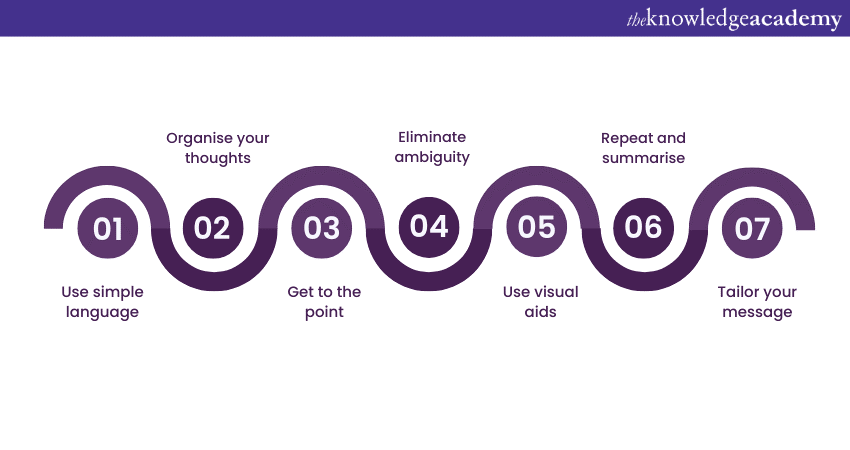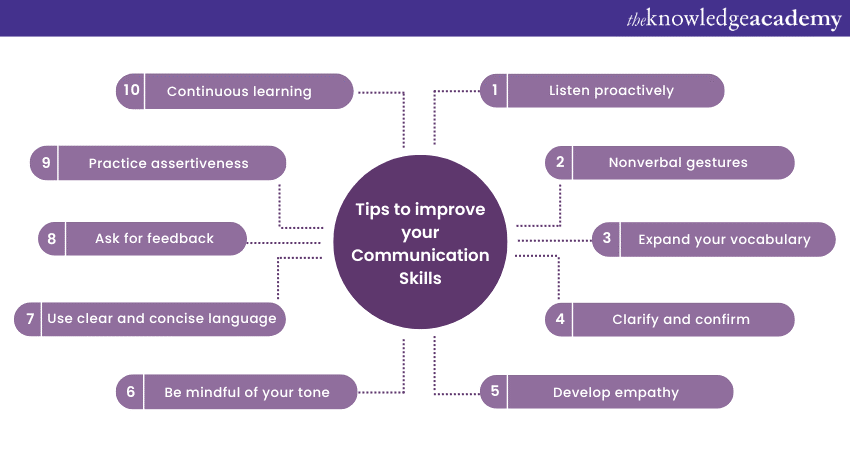We may not have the course you’re looking for. If you enquire or give us a call on 01344203999 and speak to our training experts, we may still be able to help with your training requirements.
Training Outcomes Within Your Budget!
We ensure quality, budget-alignment, and timely delivery by our expert instructors.

When it comes to your personal and professional lives, Communication skills play a vital role. They are the foundation for building relationships, expressing ideas, and conveying messages effectively. But do you know what the building block for good Communication is? It’s the 7 Principles of Communication that can help you effectively improve your Communication skills.
Be it written or nonverbal or Verbal Communication, learning about these foundational blocks is essential for success in today’s interconnected world. In this blog, you will learn the Seven Principles of Communication along with tips and tricks to improve your communication skills.
The Principles of Communication are clarity, conciseness, consideration, and completeness. understanding these principles can help you achieve confidence and eliminate the fear of judgement. So, read this blog to know more these principles and enhance your productivity and improve collaboration.
Table of Contents
1) What are the Principles of Communication?
a) Principle of clarity and conciseness
b) Principle of verbal and non-verbal Communication
c) Principle of active listening
d) Principle of feedback and response
e) Principle of empathy and emotional intelligence
f) Principle of adaptability and flexibility
g) Principle of respect and open-mindedness
h) Principle of coherence
2) Tips to improve your Communication skills
3) Conclusion
What are the Principles of Communication?
The Principles of Communication are fundamental guidelines that enhance effective and meaningful individual interactions. These serve as valuable tools to convey ideas, information, and emotions clearly and efficiently.
Understanding and applying these principles of Communication can greatly enhance the overall effectiveness of our interactions. They also contribute to successful Communication outcomes. So, let’s explore each of them in detail:
Principle of Clarity and Conciseness
Clarity and conciseness play a pivotal role when it comes to effective Communication. To convey your message successfully, it's crucial to express your thoughts in a clear and easy manner. Here are some tips to enhance clarity and conciseness:

a) Use simple language: Avoid complex jargon that may confuse your audience. Instead, opt for words and phrases easily understood by laymen. .
b) Organise your thoughts: Take a moment to structure your ideas before communicating. Create a logical flow to ensure easy comprehension.
c) Get to the point: Be direct and concise. Avoid unnecessary elaboration and state key points upfront to capture your audience's attention.
d) Eliminate ambiguity: Precise Communication leaves no room for confusion or misinterpretation.
e) Use visual aids: Charts, diagrams, or illustrations can clarify complex information and make it more accessible.
f) Repeat and summarise: Reinforce clarity by reiterating important points and summarising key information throughout your Communication.
g) Tailor your message: Adapt your Communication style and language to suit your audience's understanding.
Principle of verbal and non-verbal Communication
Effective Communication involves more than just words. Verbal and non-verbal aspects play a crucial role in accurately conveying your message. Consider the following points to improve them:
a) Verbal communication: Pay attention to your tone, pitch, and pace of speech. Try to use clear and concise language to convey your message effectively.
b) Communication: Be mindful of your body language, facial expressions, gestures, and eye contact. They can enhance or contradict your words.
c) Active listening: Engage in active listening by maintaining eye contact and providing feedback to show understanding.
d) Empathy and understanding: Show empathy through your non-verbal cues and verbal responses. Seek to understand others' emotions and experiences. For example, nod your head in affirmation whenever you want to show empathy.
e) Cultural sensitivity: Respect and be aware of cultural differences in Communication norms and non-verbal cues.
Supercharge your Communication skills and advance your career with our Communication Skills Training!
Principle of active listening
Active listening is a crucial aspect of effective Communication. It goes beyond simply hearing words. It involves fully engaging with the speaker and understanding their message. Here are some key points to practice active listening:
a) Maintain eye contact: Demonstrate your attentiveness and interest by maintaining eye contact with the speaker. It shows that you are actively engaged in the conversation.
b) Avoid interruptions: Resist the urge to interrupt or interject while the speaker is talking. Let them express their thoughts and ideas fully before responding.
c) Provide verbal and non-verbal feedback: Nodding, using affirming words, and providing verbal cues like "I see" or "Yes" lets the speaker know that you are actively listening and understanding.
d) Ask questions to seek clarity: Seek clarification when needed to ensure that you have a clear understanding of the speaker's message. Ask open-ended questions to encourage further elaboration.
e) Avoid distractions: Minimise distractions by focusing your attention solely on the speaker. Put away electronic devices and maintain a calm and attentive demeanour.
f) Show empathy: Try to understand the speaker's perspective and emotions. Show empathy through your facial expressions and body language, providing a supportive environment for effective Communication.
g) Summarise and reflect: Summarise the speaker's main points to demonstrate your comprehension. Reflecting on their words shows that you value their input and encourages further dialogue.
Principle of feedback and Response
Feedback and response make up one of the most important Principles of Communication. They enable a two-way exchange of information and help ensure clarity and understanding. Here are some key considerations for providing feedback and response:
a) Be constructive: Offer feedback constructively, focusing on specific behaviours or actions rather than personal attacks. Provide suggestions for improvement to facilitate growth.
b) Avoid interruptions: Actively listen to the speaker's message before providing feedback. Understand their perspective and acknowledge their feelings or concerns.
c) Timeliness: Provide feedback on time to maximise its impact. Address issues promptly, but also allow sufficient time for reflection and thoughtful response.
d) Balance positive and constructive feedback: Recognise and appreciate what the speaker did well and offer constructive feedback to highlight areas for improvement. Further, strive for a balanced approach.
e) Use "I" statements: Express your thoughts and feelings using "I" statements to avoid sounding accusatory. For example, say, "I noticed..." or "I felt..." instead of making generalisations.
f) Seek clarification: If something is unclear or you need further information, ask clarifying questions before providing feedback. This ensures that you have a complete understanding of the situation.
g) Encourage dialogue: Engage in a dialogue with the speaker to discuss their feedback and response. Build an open and safe environment that promotes honest and meaningful Communication.
Principle of empathy and emotional intelligence
Empathy and emotional Intelligence is one of the key Principles of Communication. By incorporating these qualities into your interactions, you can foster deeper connections and create a supportive environment. Here are some key ways to integrate empathy and Emotional Intelligence:
a) Recognise and validate emotions: Acknowledge and accept the feelings expressed by others.
b) Put yourself in other's shoes: Consider others' backgrounds, experiences, and emotions to understand people better.
c) Use empathetic language: Choose words that convey understanding and compassion.
d) Control your emotions: Practice emotional intelligence by managing your own emotions during Communication.
e) Non-verbal cues: Pay attention to facial expressions and body language for valuable insights into others' emotions.
f) Practice empathetic problem-solving: Seek solutions that consider the needs and feelings of all parties involved.
Principle of adaptability and flexibility
Adaptability and flexibility allow you to adjust to different situations and meet the needs of diverse individuals. Here are key points to enhance adaptability and flexibility:
a) Embrace change: Be open to new ideas and perspectives and adapt your Communication style accordingly.
b) Tailor your approach: Adjust your Communication style to meet the preferences and needs of different individuals.
c) Handle unexpected situations: Stay calm and composed when faced with unexpected challenges and respond flexibly.
d) Collaborate effectively: Work well with others by being adaptable and finding common ground.
e) Seek continuous improvement: Be willing to learn and grow and adapt your Communication skills accordingly.
f) Be resilient: Bounce back from setbacks and navigate through obstacles with flexibility.
Principle of respect and open-mindedness
Respect and open-mindedness are foundational Principles of Communication. By embracing these principles, you create an inclusive and collaborative environment. Here's how to incorporate respect and open-mindedness:
a) Value diverse perspectives: Appreciate and actively seek out different viewpoints, recognising the value they bring to the conversation.
b) Practice active respect: Treat others with courtesy, dignity, and empathy, regardless of differences in opinion or background.
c) Foster inclusive dialogue: Encourage open and respectful discussion where everyone feels heard and valued.
d) Suspend judgment: Avoid making assumptions or jumping to conclusions before fully understanding others' perspectives.
e) Embrace constructive feedback: Accept feedback gracefully and use it as an opportunity for growth and improvement.
f) Be mindful of language: Use inclusive and non-discriminatory language that promotes a sense of belonging for all.
Principle of coherence
Coherence is one of the main Principles of Communication, which means that the message should be organised and presented logically and consistently. Coherence helps the receiver to understand and follow the message easily and to remember the main points of the speech. Here are some key points to practice coherence in Communication:
a) Use clear and concise language: Avoid ambiguity and confusion using simple and precise words. Choose the most appropriate words for your purpose and audience.
b) Use transitions and connectors: Link different parts of your message with words or phrases that show their relationship. Transitions and connectors help to create a smooth flow and a clear structure for your message.
c) Use headings, subheadings, bullet points, and numbering: Organise your message into sections and sub-sections with headings and subheadings. Use bullet points and numbering to highlight the key points and make your message easier to read and follow.
d) Use examples, illustrations, and evidence: Support and explain your main ideas with relevant examples, illustrations, and evidence.
e) Use repetition and summary: Reinforce and review your main points by repeating them at strategic points in your message. Summarise your message at the end to remind the receiver of the main points and the purpose of your Communication.
f) Use consistent formatting: Use consistent fonts, colours, sizes, alignments, and margins for your message.
Tips to improve your Communication skills
Enhancing your Communication skills can greatly benefit your personal and professional relationships. Here are some valuable tips to help you become a more effective Communicator:

a) Give the speaker your full focus, maintain eye contact, and respond empathetically.
b) Use simple language to convey your thoughts and ideas.
c) Pay attention to your body language, facial expressions and gestures to enhance your message.
d) Try to understand others' perspectives and emotions to foster understanding and connection.
e) Focus on constructive and uplifting words to create a positive and supportive atmosphere.
f) Welcome feedback from others to identify areas for improvement and adjust your Communication style accordingly.
g) Be flexible in your approach, adapting your Communication style to different individuals and situations.
Signup for our Communication And Interpersonal Skills Course and learn how to enhance your professional relationships.
Conclusion
We hope that after reading this blog, you have understood everything about the Sever Principles of Communication. Apart from this, you would have also learned about tips and tricks to improve your Communication skills. By combining the Seven Principles of Communication along with useful tips, you can effectively improve your Communication skills.
Unlock the power of effective Communication with our Effective Communication Skills Training - Sign up now.
Frequently Asked Questions
Upcoming Business Skills Resources Batches & Dates
Date
 Public Speaking Course
Public Speaking Course
Fri 28th Jun 2024
Fri 9th Aug 2024
Fri 25th Oct 2024
Fri 27th Dec 2024







 Top Rated Course
Top Rated Course



 If you wish to make any changes to your course, please
If you wish to make any changes to your course, please


